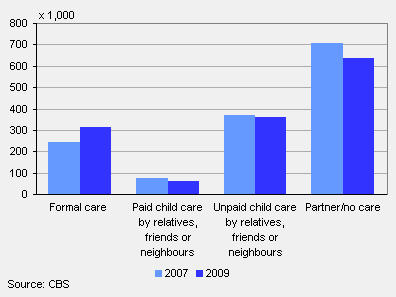Childcare more important for working parents

Childcare provided by day care centres, after-school care and voluntary care were the main types of childcare in 2009 for more than half of the 1.4 million households in the Netherlands with one or two working parents. Nearly 740 thousand households were involved, i.e. an increase by more than 50 thousand relative to 2007.
Formal childcare booming
The increase in the use of childcare facilities is entirely accounted for by day care centres, after-school care or care provided by host-parents, the three types of formal childcare. Last year, nearly 450 thousand households with one or two working parents used formal childcare. Formal childcare was the most important type of childcare for 313 thousand of these households, an increase by 70 thousand relative to 2007.
The increase in the use of formal childcare is partly caused by amendments to the Childcare Act, like the introduction of the compulsory employers’ contribution, a higher government contribution for the middle and higher income brackets and the supply of after-school care facilities on primary schools. The number of couples with children and one working parent has declined by more than 50 thousand between 2007 and 2009.
Households by main type of childcare

Households with young children rely on formal childcare
In nearly four in ten households with children under the age of 4, the main types of formal care are day care centres and care provided by host parents. Formal care of young children is currently more important than unpaid childcare, but households with their youngest child in primary-school age mostly rely on relatives, friends or neighbours.
Households by main type of childcare and age of their youngest child

Relatives, friends or neighbours particularly important for parents with small part-time jobs
If couples with children combine a full-time with a small part-time job of 12 to 24 hours a week, relatives, friends and neighbours often look after the children. This applies to 36 percent of these couples. Only one in five use formal types of childcare. If both parents work in full-time or large part-time jobs (24 to 35 hours a week), formal childcare is more important than informal care provided by relatives, friends and neighbours.
Households by main form of childcare and participation of the parents on the labour market, 2009

Henk-Jan Dirven